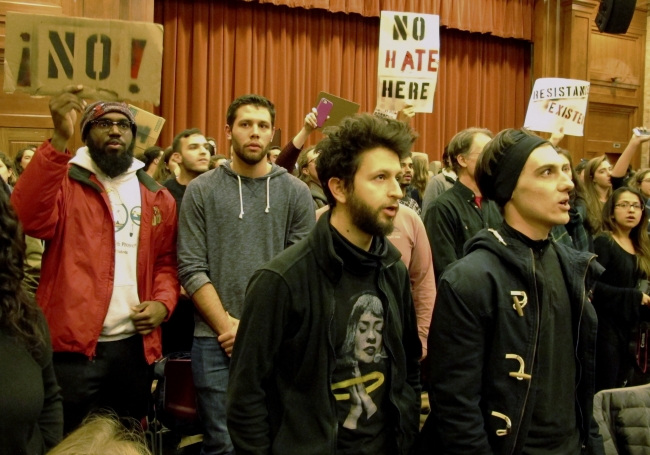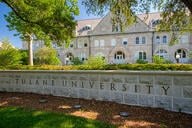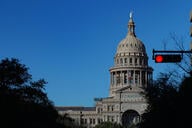You have /5 articles left.
Sign up for a free account or log in.

Students protest Charles Murray's speech at Middlebury College in March.
AP Photo/Lisa Rathke
WASHINGTON -- At a congressional hearing on free speech on college campuses Thursday, witnesses and senators from both parties championed the free exchange of a diversity of ideas, though they almost all had the same opinion: free speech needs to be vigorously defended on college campuses in the wake of a spate of instances in which students have shouted down speakers.
Allison Stanger, a professor of international politics and economics at Middlebury College, was one of the witnesses at the Senate Committee on Health, Education, Labor and Pensions’ Thursday hearing, “Exploring Free Speech on College Campuses.” She joined Senators Lamar Alexander and Patty Murray -- the Republican chairman and ranking Democrat, respectively -- in expressing her commitment to seeing colleges uphold free speech.
But Stanger’s testimony was as personal as it was political.
In March, the libertarian scholar Charles Murray visited Middlebury, a private liberal arts college in Vermont -- or, as Stanger described it at the hearing, a “bubble within a bubble” -- for a speech that Stanger was to moderate. Although Stanger is a Democrat, and she did not invite Charles Murray (with whom she said she disagrees on a number of issues), she decided to moderate the event because she wanted her students to be exposed to conservative thinkers, she said Thursday.
That speech was disrupted by protesters, who later physically attacked Charles Murray and Stanger, leaving Stanger with a concussion and whiplash. Students and professors had assailed Charles Murray as antigay and racist (charges of racism stem from a book he co-wrote in 1994 that, in part, controversially addresses IQ differences among different races).
Still, Stanger defended free speech Thursday, criticizing Middlebury students and faculty members along the way, mostly on their rush to judgment on Charles Murray. The Southern Poverty Law Center -- whose president, Richard Cohen, was also a witness and sat next to Stanger -- labeled Charles Murray a white nationalist, a label Stanger disputes.
“We can and must do better,” she said, decrying the students and professors who admitted they had not read about Charles Murray or his work beyond what the SPLC published. “Some faculty acknowledged publicly that they had not read a thing Charles Murray had written, but still knew everything they needed to know about him from what the Southern Poverty Law Center website had to say about him.”
“Some students believed that shutting down speech was a means to social justice. Some Middlebury faculty shared that view, thereby encouraging radical action.”
While senators pressed witnesses for best practices, constitutional requirements to uphold free speech and the balance of liberal and conservative voices on campus, the general consensus was that the colleges themselves were doing their best to uphold the First Amendment. While the University of Florida’s roughly $600,000 security tab for hosting a speech by the white supremacist Richard Spencer was cited as worrisome, college administrations generally drew praise for their efforts to support free speech.
Another concern expressed by those at the hearing was Spencer's rise into the mainstream political discourse, as well as the rise of other figures affiliated with the so-called alt-right, such as Milo Yiannopoulos. Both men, who espouse racist, sexist and xenophobic ideas, have gone on speaking tours at college campuses, sometimes being invited by students and other times renting space like any member of the public could.
“An unusual thing happened during the presidential campaign: white supremacists openly endorsed President Trump,” Cohen said. In most cases, both the Republican and Democratic Parties are unappealing to those types of groups, but their coalescence around Trump -- and his success -- have helped vault them into the political discourse. “They feel, rightly or wrongly, that they have the ear of the president, especially when they had [former presidential adviser Steve] Bannon there.”
“When you look at who we have in the White House right now … it should not come as a surprise when we see an apparent resurgence of hate, bigotry, xenophobia and misogyny on our campuses,” said Senator Murray, the Washington Democrat.
Still, some senators expressed worry that college speakers might be approaching the tipping point of free speech limits -- the equivalent of shouting “fire” in a crowded theater, said Senator Maggie Hassan, a New Hampshire Democrat. She pointed to two recently filed lawsuits seeking to hold Spencer and organizers of the “Unite the Right” rally accountable for the violence that occurred when white nationalists gathered in Charlottesville, Va., ostensibly to protest against the proposed removal of Confederate statues. In addition to protesters shouting racist and anti-Semitic chants, a man drove his car through a crowd of counterprotesters, killing a woman, and plaintiffs say the organizers saw the violence coming during the planning stages.
Hassan also brought up the Spencer supporters arrested for attempted murder after Spencer’s University of Florida speech, one of whom also attended the Unite the Right rally.
“Courts have also recognized that the First Amendment has constraints,” Hassan said. “When does unprotected speech cross the line into the unprotected incitement of violence? And can’t we agree that the university has a responsibility to protect its students from this kind of planned violence?”
Senator Tim Kaine, a Virginia Democrat, also expressed skepticism about how the First Amendment was being applied in some cases.
“Colleges should be a place of robust speech and disagreement. We don’t need to protect people from free speech; we need to expose them to different ideas and have them use their critical faculties to determine what is right and wrong,” Kaine said. “But, I think, we cannot use the banner of protecting free speech to allow people to terrorize folks.”
But as Cohen pointed out, while harassment and violence are not protected speech, the bar for free speech crossing a line and becoming an unprotected incitement of violence is very high.
“I think it would be difficult, perhaps, to prove some of the allegations [in the Charlottesville lawsuit], to be honest,” Cohen said. “Clearly, incitement has a very precise legal meaning under the Constitution … There could be evidence of that. Bravado in advance [is] probably not enough. Celebrating someone’s demise in an ugly way, clearly not enough.”
The panel generally formed a consensus that the best way to combat hate speech is with more positive speech. And while that is certainly a pro-free-speech opinion, it’s not -- as the Middlebury protesters demonstrated in March, and colleges have seen since -- the only opinion.




